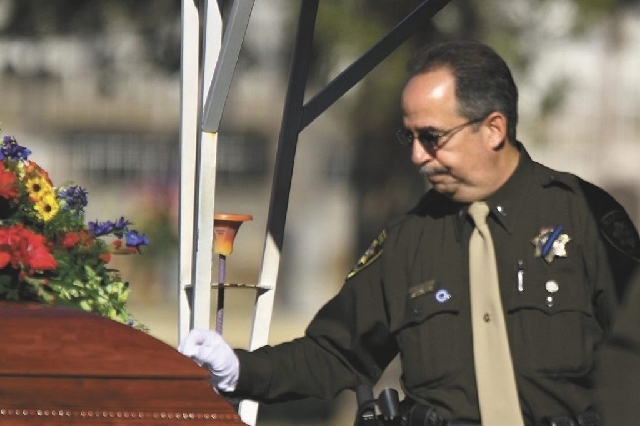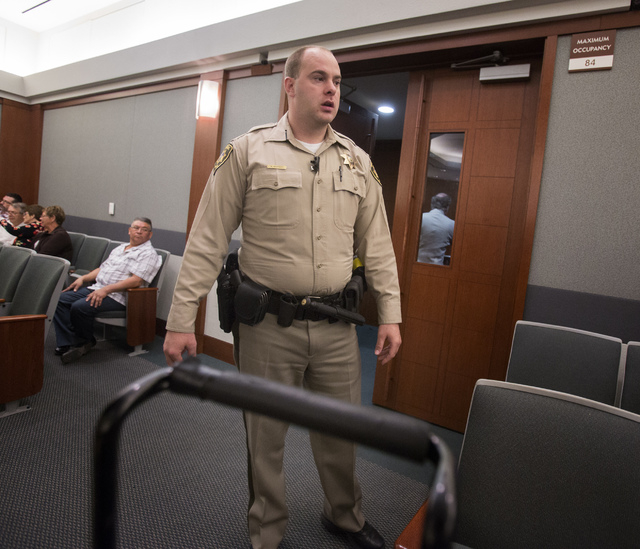Marshal’s stun gun confrontation with co-worker sparked two investigations
Kenneth Hawkes was just a rookie when a fellow marshal pulled out a stun gun and stuck it in his back during a public argument two years ago at Clark County Family Court.
The Sept. 7, 2011, confrontation, which occurred at the main entrance to Family Court where hundreds of people pass through metal detectors each day, is the latest in a series of revelations that have led courthouse employees to suggest some marshals there were out of control.
At the center of the allegations of misconduct is Steve Rushfield, the former supervisor of Family Court marshals. He is the subject of an FBI investigation into allegations he choked a woman while she was restrained in a holding cell in May 2010, and tried to cover up the incident.
Marshal Gregory Bryant, one of Rushfield’s loyal friends, did not discharge his stun gun; but his conduct sparked two internal investigations, one against him and one he sought against Hawkes.
After Bryant came under investigation, he filed a complaint alleging Hawkes had improperly discussed the internal inquiry with a businessman outside of the courthouse.
An internal investigator, however, concluded the allegations were false and retaliatory in nature. It turned out the businessman was close to both Bryant and Rushfield, and Hawkes was in San Francisco attending a 49ers game when his accuser claimed to have spoken with him in Las Vegas.
Family Court Chief Judge Gloria O’Malley said in a statement to the Las Vegas Review-Journal that an internal investigation of Bryant “sustained” the stun gun allegations and she “immediately disciplined” him.
Bryant, who worked as O’Malley’s courtroom marshal, was given a written admonishment.
“Marshal Bryant acknowledged his need to comply with professional expectations, take corrective action and follow policies and procedures,” O’Malley said. “He was advised that failure to comply with corrective action may result in further discipline up to and including termination.”
Several marshals familiar with the incident said Bryant’s punishment was minimal.
“It pretty much got swept under the carpet as horseplay,” one marshal said.
Just days before the confrontation between Bryant and Hawkes, according to the marshals, Bryant was heard saying, “I wish I could kill that kid.”
Hawkes, then a part-time marshal, was so afraid of retaliation by Rushfield and Bryant that he didn’t report the stun gun incident, other marshals said.
Another marshal reported it.
“Since Rushfield became the supervisor in Family Court, there was this oppressive culture of ‘don’t defy me’ and ‘don’t cross me,’ ” a marshal said. “Kenny ended up transferring to the Regional Justice Center because of concerns about retaliation.”
The downtown Regional Justice Center houses Clark County District Court. Family Court, at 601 N. Pecos Road, is a division of District Court.
Hawkes, who declined comment, is now a marshal for District Judge Valerie Adair.
O’Malley acknowledged that a complaint “regarding breach of confidentiality” filed by Bryant against Hawkes was not substantiated.
But, she added, “No subsequent counter-complaint was filed relating to any false allegations or harassment. Further, I am confident that if there were facts suggesting retaliation or false allegations, our manager of human resources would have initiated an investigation.”
That manager is Ed May.
Earlier this year, FBI agents carted boxes of files from May’s office in the Regional Justice Center. Agents had subpoenaed records from internal investigations of Family Court marshals over several years.
O’Malley refused to provide the Review-Journal with copies of the internal investigative reports in both cases tied to the stun gun confrontation, calling the documents confidential employee records.
The Review-Journal reported last month that FBI agents have interviewed current and former courthouse employees in a stepped-up investigation into allegations of excessive force by Family Court marshals and possible cover-ups of their actions.
Allegations have surfaced that administrators with personal relationships with Family Court marshals allowed misconduct, including excessive use of force, to continue with little or no punishment.
A former courthouse employee said the agents were looking for evidence of court officials failing to take action following internal investigations of marshals.
More than a half-dozen marshals, including internal affairs investigators, have been interviewed by the FBI.
Some Family Court marshals also have testified before a federal grand jury reviewing allegations that Rushfield choked Crystal Williams on May 20, 2010, while she was confined to a restraining chair. Williams has also testified.
Rushfield also has been accused by other marshals of trying to cover up the choking incident as well as an incident involving a marshal accused of groping a woman at Family Court.
The marshal, Ron Fox, is accused of assaulting Monica Contreras, 28, who was in Family Court on Aug. 8, 2011, for a divorce-related hearing.
Fox denies wrongdoing, but the FBI is also interested in that case.
In a courtroom incident captured on videotape, Contreras complained to a hearing master that Fox groped her in a witness room under the guise of searching for drugs.
Rushfield escaped serious discipline over the choking incident.
Also, despite a recommendation from Bob Bennett, the District Court’s director of security, that Rushfield be fired over a series of misconduct incidents, court administrators did not dismiss him.
Following a March Review-Journal article about allegations of misconduct among Family Court marshals, Rushfield stepped down as supervisor of Family Court marshals, going to work as a courtroom marshal for Family Court Judge Frank Sullivan.
Contact reporter Jeff German at jgerman@reviewjournal.com or 702-380-8135. Follow him on Twitter @JGermanRJ.































